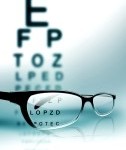 Do you groan when it’s time to get new glasses? I know I do. How about the real cost of contact lenses—not just the cost per box, but the cleaning solution and lens storage cases?
Do you groan when it’s time to get new glasses? I know I do. How about the real cost of contact lenses—not just the cost per box, but the cleaning solution and lens storage cases?
Looking after your eyes is an expensive business. Every year you can easily spend hundreds of dollars on vision care. Good news! A FSA or HSA medical savings account can help you save on these recurring expenses.
An FSA, or Flexible Spending Account, is a tax free account for medical expenses, such as prescriptions, dependent care, over the counter medications, doctor visits, and more. The account is set up and owned by your employer. Every month, an amount is deducted from your pay check and deposited into the FSA. Because you’re not taxed on this money, you’ll have more of it to use for eligible expenses. FSA funds don’t roll over into the next year, so you have to use it or lose it within the plan year.
A Health Savings Account (HSA) is similar but differs in how it operates. For one thing funds accumulate in your account until you use them and the plan moves with you should you change jobs. However, there are more restrictions to qualify for an HSA.
To use both FSA and HSA funds for medical expenses you must have a doctor’s prescription, and vision care items are no exception. Prescription eyeglasses and contact lenses are FSA/HSA eligible, as well as prescription colored contacts as long as they are vision-correcting.
While these are obvious vision care costs, many people don’t know that contact lens supplies like saline solution, enzyme cleaner and storage cases are also eligible, as well as prescription sunglasses and reading glasses.
Here’s a list of what’s eligible and a link to the IRS website with more information:
- prescription contact lenses
- prescription colored lenses (must be vision correcting , not Plano, 0.00, or zero power)
- prescription eyeglasses and sunglasses
- eye exam
- saline solution
- enzyme cleaner
- lens storage cases
- eye surgery
Remember, FSA and HSA money is still your money…you put it there. But because it is tax free, you’ll be saving because it won’t be counted as part of your gross taxable income. And, because it is a kind of forced savings, the money will be there for vision related expenses when you need it most.

No Comments